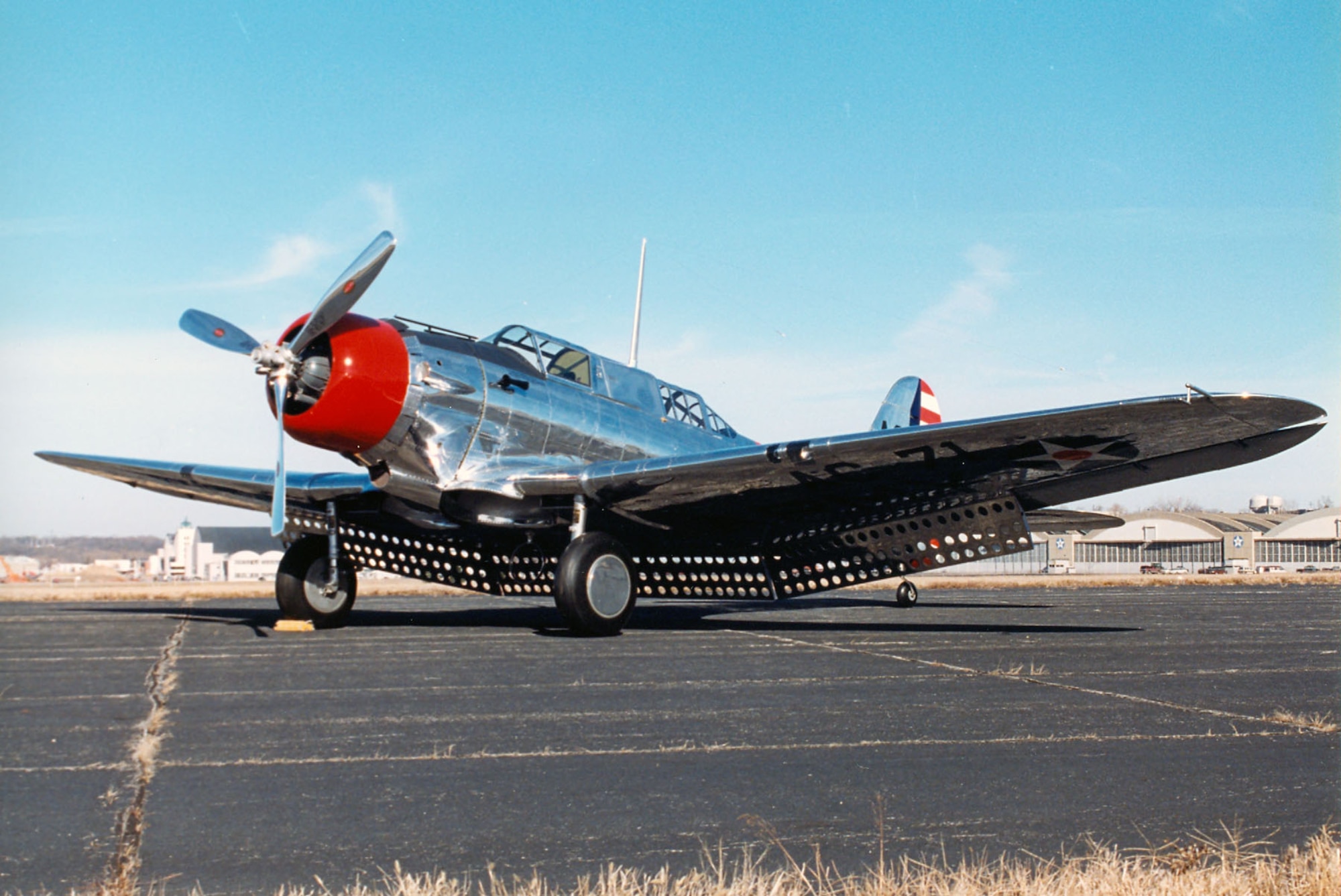Overview
Hello again! I now suggest the A-17 Nomad, a true wonder of its time, only being built too early to see any major action, but can now be hopefully seen in the game!
Basic Information
Designation: A-17A (Military), Gamma 2F (Manufacturer)
Name: “Nomad”
Role: Ground Attack Aircraft
Crew: 2
Manufacturer: Northrop Corporation
Total built: 411
Service Life: 1936-1944
Specifications
Specs - Dimensions
Length: 31 ft 8.6 in (9.67 m)
Wingspan: 47 ft 8.5 in (14.54 m)
Wing Area: 363 sq. ft (33.7 m²)
Height: 11 ft 10.5 in (3.62 m)
Specs - Flight Performance
Engine(s): 1x Pratt & Whitney R-1535-13 Twin Wasp Jr two-row air-cooled radial engine, 825 hp (615 kW)
Maximum Speed: 206 mph (332 km/h)
Cruise Speed: 170 mph (274 km/h)
Service Ceiling: 19,400 ft (5,915 m)
Rate of Climb: 1,350 ft/min (6.9 m/s)
Max Range: 650 mi (1,046 km)
Empty weight: 4,874 lb (2,211 kg)
Max Takeoff Weight: 7,337 lb (3,328 kg)
Specs - Armament
Specs - Armament - Offensive Armament
- 4x .30 (7.62 mm) M1919 Browning Machine Guns
Specs - Armament - Defensive Armament
- 1x .30 (7.62 mm) M1919 Browning Machine Gun in a rearward flexible mount
Specs - Armament - Suspended Armament
Total Carrying Capacity: 1,200 lb (544 kg)
-
Internal Bay, capable of carrying 20x 30 lb bombs in vertical chutes
-
External Wing Racks carrying a variety of ordinance
Specs - Additional Information
Airbrake: Lower Perforated flaps
Landing Gear: fully retractable, exposed
Usage in Battles
The A-17A Nomad would be an interesting aircraft for low BRs, using an almost “Quantity over Quality” strategy, seeing how it carries many offensive machine guns and bombs, however the calibers and bomb weights are rather small, requiring more skill, but once perfected, would be a force to reckon with in air and ground battles.
Pros:
-
Large bomb load for its size
-
Decent offensive armament
-
Decent Dogfighting Capability
Cons:
-
Poor standard bomb size
-
Small machine gun calibers
-
little defensive armament
History
The Northrop A-17 was an attack bomber derivative of the Northrop Gamma transport aircraft, developed alongside the Northrop Gamma 2C. The Gamma 2F had a redesigned tail, canopy and wing flaps, and was fitted with a semi-retractable landing gear system. It was delivered to the United States Army Air Corps for testing on October 6, 1934. After a handful more modifications which included fitting with a conventional fixed landing gear, it was accepted by the US Army Air Corps. A total of 110 aircraft were ordered, designated the A-17 in 1935.
The A-17 was equipped with perforated flaps, and had fixed landing gear with partial fairings equipped instead. It was fitted with an internal fuselage bomb bay that carried small fragmentation bombs and well as external bomb racks on the wings.
Soon after, Northrop developed new landing gear system, this time completely retractable, naming it the A-17A. This version was again purchased by the Army Air Corps, placing orders for 129 aircraft. By the time these were delivered, the Northrop Corporation had been taken over by Douglas Aircraft Company, with new export models being known as the Douglas Model 8.
The A-17 entered service in February 1936, and had proven itself a reliable and popular aircraft among its pilots. However, in 1938, the Air Corps decided that attack aircraft should be designed as multi-engined per new doctrine, the A-17 was then rendered surplus to its requirements.
From December 14, 1941, A-17s were used for coastal patrols by the 59th Bombardment Squadron along the Panama Canal, its service in the USAAC peaceful and uneventful, with the last remaining A-17s being used as utility aircraft and were retired from USAAF service in 1944.
While the A-17 saw no action in the USAAC, its military career did see combat in other countries air forces, seeing action in the Ecuadorian–Peruvian War, use by the Netherlands and Norway during their respective WW2 German invasions, the and the Anglo-Iraqi War. As of today, only a handful remain in museums and collections.
Additional Photos
https://media.defense.gov/2007/Oct/30/2000435689/2000/2000/0/071030-F-1234S-013.JPG
https://media.defense.gov/2015/Jul/17/2001261921/2000/2000/0/150712-F-IO108-045.JPG
https://media.defense.gov/2007/Oct/30/2000435688/-1/-1/0/071030-F-1234S-014.JPG
https://media.defense.gov/2007/Jan/23/2000520060/2000/2000/0/070123-F-1234S-005.JPG
https://media.defense.gov/2007/Jan/23/2000520057/-1/-1/0/070123-F-1234S-007.JPG
https://www.aviastar.org/pictures/usa/northrop_a-17.jpg
https://upload.wikimedia.org/wikipedia/commons/a/a5/90th_Attack_Squadron_-_Northrop_A-17_35-78.jpg
https://encrypted-tbn0.gstatic.com/images?q=tbn:ANd9GcScSDqeR7KPQJQKpncLMfKufrtXSzCP-Bv7vA&usqp=CAU
https://ids.si.edu/ids/deliveryService?id=damsmdm:NASM-NASM.XXXX.0356-M0000583-00020
https://c8.alamy.com/comp/2RG9KRH/united-states-army-air-service-northrop-a-17-2RG9KRH.jpg
Sources
Northrop A-13, A-16, A-17, A-33 - attack aircraft
Northrop A-17 (Nomad) Gound-Attack Monoplane Aircraft
Northrop A-17 - An Important Stepping Stone For More Advanced Aircraft in WW2 - Military-wiki
- Yes
- No
- Tech Tree
- Premium
- Event Vehicle
- Squadron
- Said no bro
